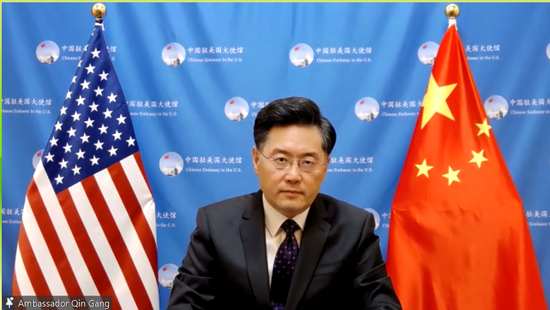
Chinese Ambassador to the U.S. Qin Gang. (Photo provided to chinadaily.com.cn) Chinese Ambassador to the United States Qin Gang has hit back at the "disinformation" about China's alleged prior knowledge of Russia's military action in Ukraine as well as the "rumors" about Moscow seeking military assistance from China, saying that all of these claims serve the purpose of "slinging mud" at China. In an opinion piece titled "Where We Stand in Ukraine" published in The Washington Post on Tuesday, the diplomat fully explained China's position on the Ukraine crisis and dispelled rumors that were recently spread by some U.S. officials. Qin's response came as unidentified U.S. officials told the New York Times that China allegedly had prior knowledge of Russia's military action and had demanded Russia delay it until the Beijing 2022 Winter Olympics concluded. Recent rumors claimed that Russia was seeking military assistance from China. "Let me say this responsibly: Assertions that China knew about, acquiesced to or tacitly supported this war are purely disinformation. All these claims serve only the purpose of shifting blame to and slinging mud at China," the Chinese diplomat said. Qin underscored the fact that there were more than 6,000 Chinese citizens in Ukraine before the conflict, and that China is the biggest trading partner of both Russia and Ukraine and the largest importer of crude oil and natural gas in the world. "Conflict between Russia and Ukraine does no good for China," he said. "Had China known about the imminent crisis, we would have tried our best to prevent it." He also warned Washington against threatening to impose sanctions against Chinese companies on the one hand and seeking China's support and cooperation on the other. "Threats against Chinese entities and businesses, as uttered by some U.S. officials, are unacceptable. Neither war nor sanctions can deliver peace. Wielding the baton of sanctions at Chinese companies while seeking China's support and cooperation simply won't work," Qin said. Observers said that amid the worsened ties between Beijing and Washington in recent years, U.S. politicians have used every opportunity to spread disinformation to smear or discredit China in an attempt to make political gains for themselves or have more bargaining power in negotiations with China. They have played such tricks since the COVID-19 pandemic started and did so after the Ukraine crisis broke out, they said. Just before the meeting between Yang Jiechi, a member of the Political Bureau of the Communist Party of China Central Committee and director of the Office of the Central Commission for Foreign Affairs, and U.S. National Security Advisor Jake Sullivan in Rome, Italy, on Monday, some U.S. officials claimed that Russia had sought military assistance from China. During the meeting, Yang stressed that China firmly opposes any words and deeds that spread disinformation and distort and smear China's position. Russian presidential spokesman Dmitry Peskov denied such claims on Monday, saying Russia has not asked China for military help for use in Ukraine. Commenting on the same claim, Chinese Foreign Ministry spokesman Zhao Lijian said the U.S.' practice is nothing short of spreading disinformation. "The U.S. has been creating and spreading disinformation from time to time. This is neither professional nor ethical, still less responsible. By doing so, the U.S. will further lose the trust of the world," Zhao said at a regular news conference on Monday. What the U.S. should do is deeply reflect upon its role in the evolving situation of the Ukraine crisis, and do more things that can help to ease the situation, he added. |